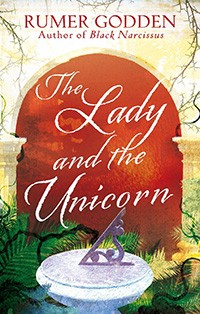Defeated by its own decay, it was dying
 The Lady and the Unicorn
The Lady and the Unicorn
by Rumer Godden
I had never heard of Rumer Godden until I flicked through the Virago Modern Classics catalogue and saw that they are reissuing her books, but she was apparently hugely successful in her lifetime. Between the 1930s and 1990s she wrote an astonishing 70 books, including most famously Black Narcissus, which was made into that wonderful film with Deborah Kerr that I have always loved but never knew was based on a novel.
Godden had an interesting life. Born to an English family in India, she moved back and forth between India and the UK throughout her life, and her first-hand knowledge of both countries is clear in The Lady and the Unicorn.
The story centres around a crumbling, decaying mansion in Calcutta, split into apartments occupied by several Eurasian families. Belonging to neither the British colonial society nor the native Indian society, they cling to pride in their “Europeanness”, but it’s a lonely position to be in.
The main focus is the Lemarchant family. There’s Father, a figure of fun to his children, struggling to maintain discipline while failing to have any over himself. Auntie, the sister of the children’s dead mother, is the family’s moral centre, and their money source. Twins Belle and Rosa are 17 and just starting to figure out how limited their options are in the world outside school. And little sister Blanche is good and kind but with her dark skin is also a source of shame.
All those statements are huge oversimplifications because Godden does an admirable job of sidestepping cliché. Temperaments and circumstances are ever-changing, particularly for the twins, as is absolutely true for every 17-year-old. And it all gets rather more complicated when the twins are invited to a party at the British social club – as the Brits are mostly men, it is common for party invites to be extended to Eurasian girls. The pairings that result are not glamorous and do not end in marriage, but they can be a ticket out of poverty.
“In the night it was a crying need…an agony of regret and blame; for hours it was like the dull sky above a river, that sees neither cloud nor colour, but the blank reflection of itself. Sometimes to ease the pain she pretended, making a castle that tumbled to pieces at a breath, and there was always fear and worry.”
So there’s a lot of human drama going on, not to mention an element of mystery as Rosa investigates the lady and the unicorn of the title – essentially the history of the house she is living in. But what really drew me into this novel was the setting. There is no overview of Calcutta as a huge bustling city. Instead, Godden brings alive the tiny pockets of the city that the characters inhabit, and in particular the house. Perhaps it’s the one romantic/gothic cliché Godden didn’t avoid, the tumbledown mansion whose grandeur has been lost over time, but it’s forgiveable as she does such a wonderful job of it. The Lemarchants’ tiny rotting apartment is a microcosm of the mansion’s lost glory. I dearly wanted to visit that house, despite its flies and cockroaches.
“Now the house seemed to be giving way; defeated by its own decay, it was dying…it could not help troubling the Lemarchants, dropping flakes of plaster from the ceiling on their furniture, blocking their drains, letting the damp creep along their walls, and all the while it was mutely apologetic, pleading forgiveness for its bad manners as some old gentleman distresses himself when he cannot behave as he would in public.”
I don’t know if Virago are reissuing all 70 of Godden’s books, but however many they do bring back I am sure they will be worth giving a try.
First published 1937 by Peter Davies.
This edition published 2015 by Virago Press.
Source: This book was kindly sent to me by the publisher in exchange for an honest review.
Sounds interesting! Thanks for bringing Godden to my attention!
Thanks for your review! I didn’t know about this author, but I must admit that I’m curious and I think I’d like this book….I feel like I can relate to this family and the author, my parents are immigrants and I was born in another country 🙂
What a terrific review! It gives me more appreciation for the novel. Thank you.